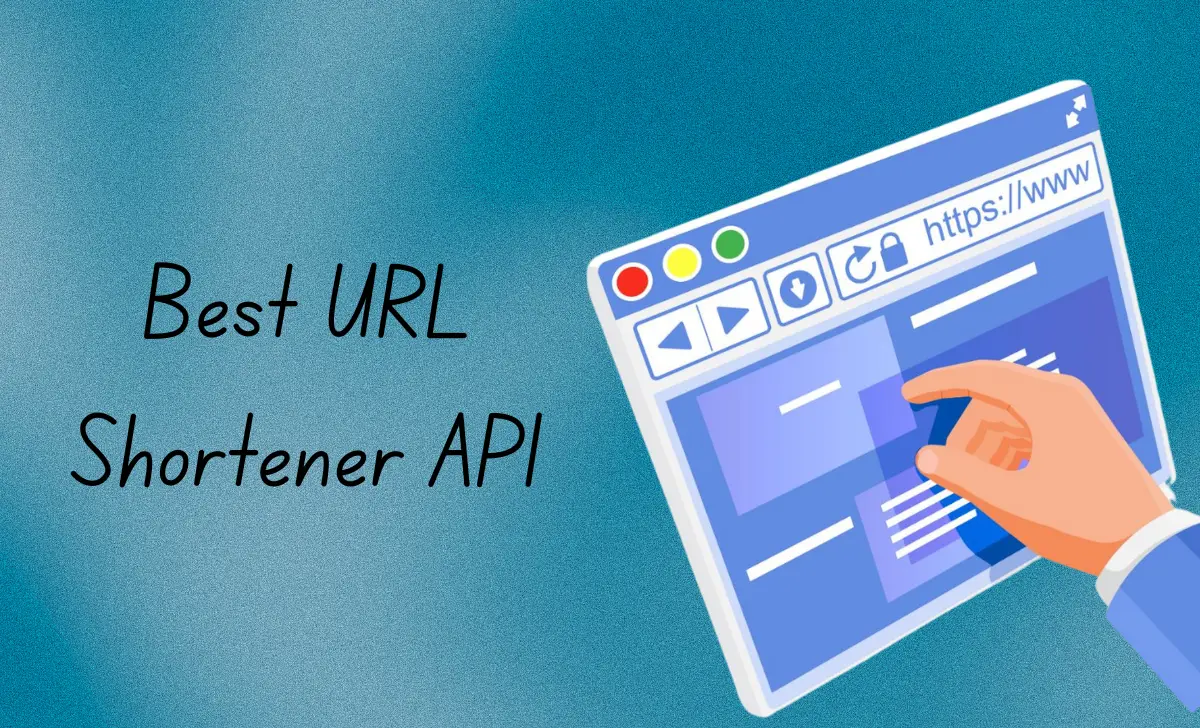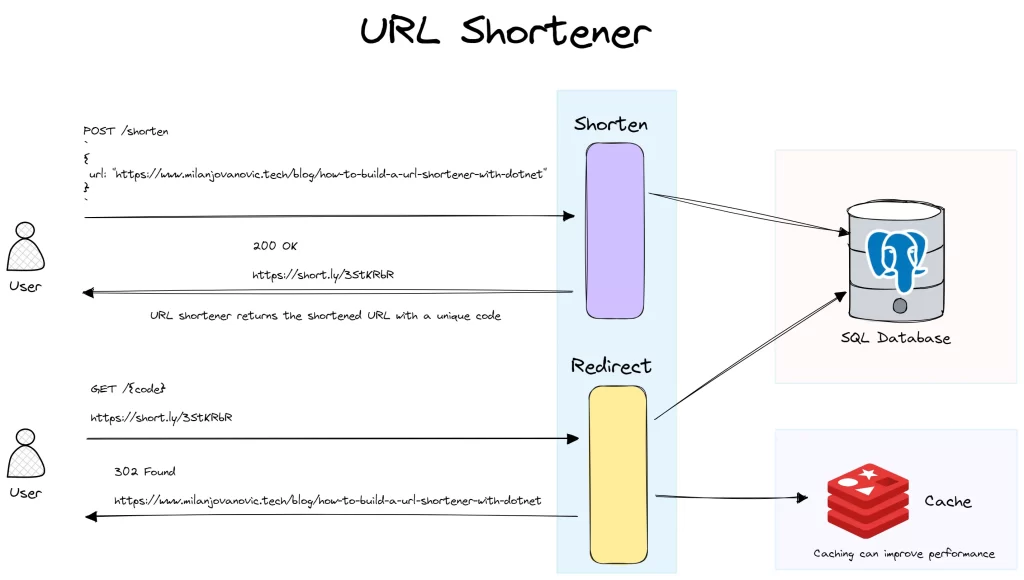
Sharing links online is a common practice, whether it’s on social media, in emails, or in presentations. But what happens when those links are long and unwieldy? They can be difficult to share, especially on platforms with character limits. This is where URL shorteners come in.
A URL shortener is a tool that takes a long URL and converts it into a shorter, more manageable link. This can be incredibly helpful for a variety of reasons. For example, it can make your links more visually appealing, easier to remember, and more shareable on social media.
But what if you need to shorten URLs programmatically? This is where URL shortener APIs come into play. A URL shortener API allows you to integrate URL shortening functionality into your own applications. This can be incredibly useful if you’re building a website, a mobile app, or any other type of software that requires URL shortening.
Contents
Why Use a URL Shortener API?

Using a URL shortener API can be incredibly beneficial for your applications and workflows. Let’s explore some of the key advantages:
- Automation: One of the main benefits of using a URL shortener API is that it allows you to automate the process of shortening URLs. This can save you a lot of time and effort, especially if you’re shortening a large number of URLs. Imagine having to manually shorten each link for your blog posts, social media updates, or marketing campaigns. It would be a tedious and time-consuming task. But with a URL shortener API, you can simply integrate it into your workflow and have it automatically shorten your URLs.
- Customization: Another advantage of using a URL shortener API is that it allows you to customize the shortened URLs. You can choose your own custom domain, add your own branding, and even track the performance of your shortened links. This level of customization can be invaluable for businesses and marketers who want to create a more professional and branded experience for their users.
- Analytics and Tracking: Many URL shortener APIs provide detailed analytics and tracking data. This data can be incredibly valuable for understanding how your shortened links are being used. You can see how many clicks your links are getting, where those clicks are coming from, and even what devices are being used to access your links. This information can be used to optimize your marketing campaigns, improve your website’s user experience, and make better decisions about your content strategy.
- Security and Reliability: When choosing a URL shortener API, it’s crucial to consider security and reliability. A reputable API provider will prioritize the security of your data and ensure that your shortened links are reliable and accessible. Look for providers that offer features like HTTPS encryption, two-factor authentication, and regular security audits. This will give you peace of mind knowing that your data and your users’ data are safe.
Choosing the Right URL Shortener API
With so many URL shortener APIs available, choosing the right one can be overwhelming. Here are some factors to consider when making your decision:
- Features: The first step is to consider the features that are most important to you. Do you need custom domains? Do you need detailed analytics? Do you need to be able to track clicks? Make a list of the features that are essential for your needs.
- Pricing: URL shortener APIs come with varying pricing models. Some offer free plans, while others charge a monthly or per-use fee. Consider your budget and choose an API that fits your financial constraints.
- Ease of Use: The API should be easy to integrate into your applications. Look for APIs with clear documentation, helpful support, and a user-friendly interface.
- Reputation: It’s important to choose an API provider with a good reputation. Research the provider’s history, read reviews from other users, and make sure they have a strong track record of reliability and security.
Best URL Shortener APIs
Now that you have a better understanding of what to look for in a URL shortener API, let’s explore some of the best options available:
1. Rebrandly
Rebrandly is a popular choice for businesses and marketers who need a robust and reliable URL shortener API. It offers a wide range of features, including custom domains, advanced analytics, and branding options. Rebrandly also prioritizes security and reliability, making it a solid choice for businesses that handle sensitive data.
Key Features:
- Custom Domains: Create shortened URLs with your own domain name.
- Advanced Analytics: Track clicks, location, device, and more.
- Branding Options: Customize your shortened URLs with logos and colors.
- Link Management: Organize your shortened links with tags and folders.
- API Integration: Easy integration with popular platforms and languages.
Pricing:
- Free Plan: Limited features and usage.
- Pro Plan: Starts at $29 per month.
- Enterprise Plan: Custom pricing for large organizations.
2. Bitly
Bitly is another well-known URL shortener API that offers a comprehensive set of features. It’s known for its user-friendly interface and its ability to track the performance of your shortened links. Bitly is also a popular choice for social media marketers, as it integrates seamlessly with popular platforms like Twitter and Facebook.
Key Features:
- Custom Short Links: Create unique short links with your own branding.
- Link Management: Organize and track your shortened links.
- Link Analytics: Track clicks, location, and device information.
- Social Media Integration: Share shortened links on popular platforms.
- API Integration: Easy integration with various applications and languages.
Pricing:
- Free Plan: Limited features and usage.
- Basic Plan: Starts at $29 per month.
- Professional Plan: Starts at $99 per month.
3. Ow.ly
Ow.ly is a URL shortener API specifically designed for social media marketers. It offers a simple and easy-to-use interface, making it a great choice for businesses that want to quickly shorten URLs for social media posts. Ow.ly also integrates seamlessly with popular social media platforms, making it easy to share your shortened links.
Key Features:
- Social Media Integration: Share shortened links on popular platforms.
- Custom Short Links: Create unique short links with your own branding.
- Link Analytics: Track clicks and other performance metrics.
- Link Management: Organize and track your shortened links.
- API Integration: Easy integration with various applications and languages.
Pricing:
- Free Plan: Limited features and usage.
- Pro Plan: Starts at $9.95 per month.
- Enterprise Plan: Custom pricing for large organizations.
4. TinyURL
TinyURL is one of the oldest and most well-known URL shorteners. It’s a simple and straightforward API that offers basic URL shortening functionality. While it may not have as many advanced features as some of the other APIs on this list, it’s still a reliable and affordable option for basic URL shortening needs.
Key Features:
- Basic URL Shortening: Shorten URLs with a simple and straightforward interface.
- Custom Short Links: Create unique short links with your own branding.
- Link Analytics: Track clicks and other performance metrics.
- API Integration: Easy integration with various applications and languages.
Pricing:
- Free Plan: Limited features and usage.
- Pro Plan: Starts at $9.99 per month.
5. Yourls
Yourls is a self-hosted open-source URL shortener. This means you can install and manage it on your own server. This gives you complete control over your data and your shortened links. Yourls is a great option for businesses that need a highly customizable and secure URL shortener API.
Key Features:
- Self-Hosted: Install and manage on your own server.
- Custom Domains: Create shortened URLs with your own domain name.
- Link Management: Organize and track your shortened links.
- Link Analytics: Track clicks and other performance metrics.
- API Integration: Easy integration with various applications and languages.
Pricing:
- Free and Open Source: Download and use for free.
- Hosting Costs: You’ll need to pay for server hosting.
How to Use a URL Shortener API
Once you’ve chosen a URL shortener API, the next step is to integrate it into your application. The process will vary depending on the API provider and the programming language you’re using. However, the general steps are as follows:
- Sign Up for an Account: Create an account with your chosen URL shortener API provider.
- Get Your API Key: Once you’ve signed up, you’ll need to get your API key. This key is used to authenticate your requests to the API.
- Integrate the API: Integrate the API into your application using the provider’s documentation. This typically involves making API calls to the provider’s server.
- Shorten Your URLs: Use the API to shorten your URLs. This will typically involve passing the long URL to the API and receiving the shortened URL in return.
- Track Your Links: Use the API to track the performance of your shortened links. This will typically involve making API calls to retrieve data about clicks, location, and device information.
Conclusion
Using a URL shortener API can be a game-changer for your applications and workflows. It allows you to automate the process of shortening URLs, customize your shortened links, track their performance, and improve the overall user experience.
When choosing a URL shortener API, consider your needs, budget, and the reputation of the provider. The best API for you will depend on your specific requirements.
FAQs
1. What are the benefits of using a URL shortener API over a web-based URL shortener?
Using a URL shortener API offers several advantages over web-based URL shorteners:
- Automation: APIs allow you to automate the URL shortening process, integrating it seamlessly into your applications.
- Customization: You can customize your shortened URLs with custom domains, branding, and tracking options.
- Analytics and Tracking: APIs provide detailed analytics and tracking data, giving you valuable insights into how your links are being used.
- Security and Reliability: Reputable API providers prioritize security and reliability, ensuring your data and your users’ data are safe.
2. How do I choose the right URL shortener API for my needs?
Consider the following factors when choosing a URL shortener API:
- Features: What features are essential for your application?
- Pricing: What is your budget?
- Ease of Use: How easy is the API to integrate and use?
- Reputation: Does the provider have a good track record of reliability and security?
3. Can I use a URL shortener API for free?
Many URL shortener APIs offer free plans with limited features and usage. However, if you need advanced features or higher usage limits, you’ll likely need to choose a paid plan.
Leave a Reply